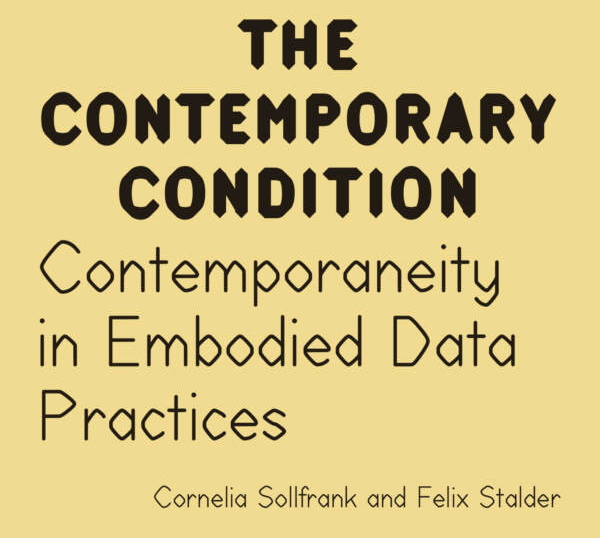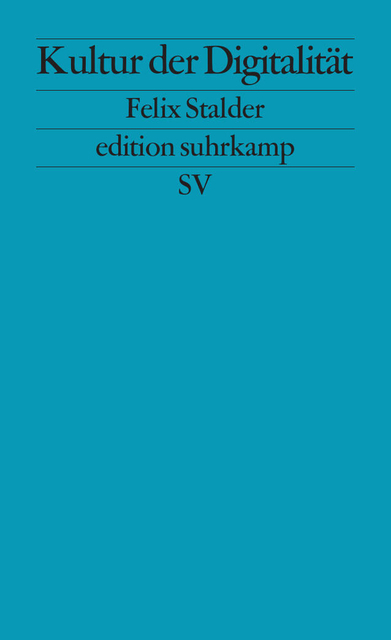New Book: Contemporaneity in Embodied Data Practices
24 April, 2025 - 15:18 by felixWhat parallels are there between a human pranayama practitioner and a migratory bird in heavily datafied environments? And what can they tell us about the need to reorient our thinking towards the planetary?
In Contemporaneity in Embodied Data Practices, two artistic field studies provide the starting point for a dialogical reflection on the entanglement of diverse temporalities in body-related, datafied, and experiential practices. Shifting through lived, historical, evolutionary, and technological rhythms, Cornelia Sollfrank and Felix Stalder unfold their respective more-than-human frames of reference, and arrive at specific forms of agency in the contemporary moment.
Sternberg Press, 2025


 内容简介:当前的文化与政治等诸多方面均受到数字状况的影响。本书认为,这种 影响涉及更多的人参与到有争议的社会意义的协商中。更多的人利用复杂的 通信基础设施,同时又被社交媒体所主导,不仅引发了当前的文化、社会与政 治现象,还导致新的行为方式的产生。作者认为,这种状况有三个关键的成 部分:利用现有的文化材料进行自己的生产,通过集体来努力地建立新意义的 方式,以及算法与自动决策的潘在作用,三者界定了“数字状况”,作者田洲 了导致当前状况的历史性结构转型,还研究了这种新文化造成的深远的政治影 响,附录文章《数字团结》的出发点,是2008年全球经济危机爆发后出现的网 格化政治组织形式的新浪潮。作者繼卡尔·马克思之后,阐述了在当前应用创 新和技术进步,与组织或限制这种进步的经济机构之间的矛盾,生产力与生产 关系之间的矛盾被置于如下背景中:我们已经永远地离开了麦克卢汉的古堡 星系,关于我们将抵达哪里的斗争才刚刚要开始。本书对于关心艺术、媒介、 传播、社会、政治与文化研究,以及想要了解今天的文化与政治正在发生的变 化的读者必不可少。
内容简介:当前的文化与政治等诸多方面均受到数字状况的影响。本书认为,这种 影响涉及更多的人参与到有争议的社会意义的协商中。更多的人利用复杂的 通信基础设施,同时又被社交媒体所主导,不仅引发了当前的文化、社会与政 治现象,还导致新的行为方式的产生。作者认为,这种状况有三个关键的成 部分:利用现有的文化材料进行自己的生产,通过集体来努力地建立新意义的 方式,以及算法与自动决策的潘在作用,三者界定了“数字状况”,作者田洲 了导致当前状况的历史性结构转型,还研究了这种新文化造成的深远的政治影 响,附录文章《数字团结》的出发点,是2008年全球经济危机爆发后出现的网 格化政治组织形式的新浪潮。作者繼卡尔·马克思之后,阐述了在当前应用创 新和技术进步,与组织或限制这种进步的经济机构之间的矛盾,生产力与生产 关系之间的矛盾被置于如下背景中:我们已经永远地离开了麦克卢汉的古堡 星系,关于我们将抵达哪里的斗争才刚刚要开始。本书对于关心艺术、媒介、 传播、社会、政治与文化研究,以及想要了解今天的文化与政治正在发生的变 化的读者必不可少。




 I'm very happy my new book (a translation of
I'm very happy my new book (a translation of 
















